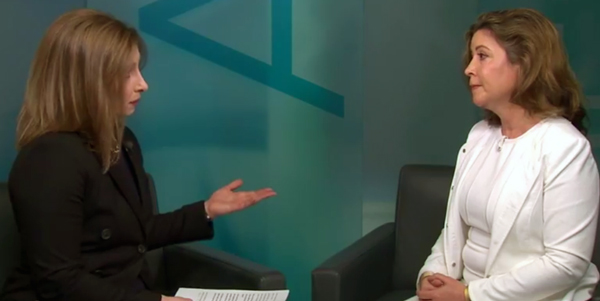By Michael Brooks
Nuclear Energy Institute CEO Maria Korsnick on Thursday expressed support for FirstEnergy Solutions’ request that the Department of Energy declare an emergency in PJM to prevent the shutdown of the company’s three nuclear plants.
But she called the request — along with state zero-emission credit (ZEC) programs — a “bridging strategy” for the industry: temporary measures to keep the plants afloat until RTOs/ISOs and FERC reform wholesale market price formation.
“Ultimately, the fix that’s needed is that recognition [of nuclear’s emissions-free output] in the marketplace. That recognition has been a bit slow in coming, which is why you’re seeing the level of activity that you’re seeing at the state level,” Korsnick said. “The long-term answer is going to be one that’s market-driven.”
Korsnick was responding to a question submitted through a Facebook Live webcast of NEI’s Annual Briefing for the Financial Community. After giving a speech on the state of nuclear industry, she answered questions, which were also submitted by email, relayed to her by NEI spokeswoman Monica Trauzzi.
In both her speech and answers to questions — some submitted by NEI staff, Korsnick was nonspecific about the issue of price formation. She instead consistently came back to the value of nuclear as a contributor to states’ carbon-reduction goals and a “resilient” source of electricity. She praised ZEC as an example of good state policy and noted that Maryland and Washington are considering carbon taxes.
“The pursuit of clean energy can threaten our nuclear plants if we don’t do it thoughtfully. If the goal is to reduce emissions, then all zero-emission technologies must be part of the solution. We must recognize what we already have in place and build on that. Replacing zero-emitting technology with other zero-emitting technology won’t help.”
She also applauded Congress’ extension of nuclear production tax credits to allow the construction of Georgia Power’s Plant Vogtle Units 3 and 4 to be completed.
But Korsnick warned that generation owners plan to prematurely close 12 reactors and that “if nothing is done to save these plants, the impacts will be devastating.”
“If all of these 12 plants close, we will lose over 120 million MWh [per year] of carbon-free generation,” she said. “That’s equal to half of all the megawatt-hours of wind electricity generated last year in the United States.
“We can stick with a myopic focus on short-term prices. Or we can strive to preserve a resilient, robust electricity system, jobs, tax revenues, clean air and healthy communities.”
To counter the grim warnings, Korsnick highlighted positive developments in the industry. She pointed to NuScale’s small modular reactor design, which she said is “progressing well” through the Nuclear Regulatory Commission, and to the Trump administration’s support for Saudi Arabia’s plans for as many as 16 nuclear reactors.
“The export market is growing, and our success there will strengthen the U.S. supply chain and its support of the existing U.S. fleet,” she said.






